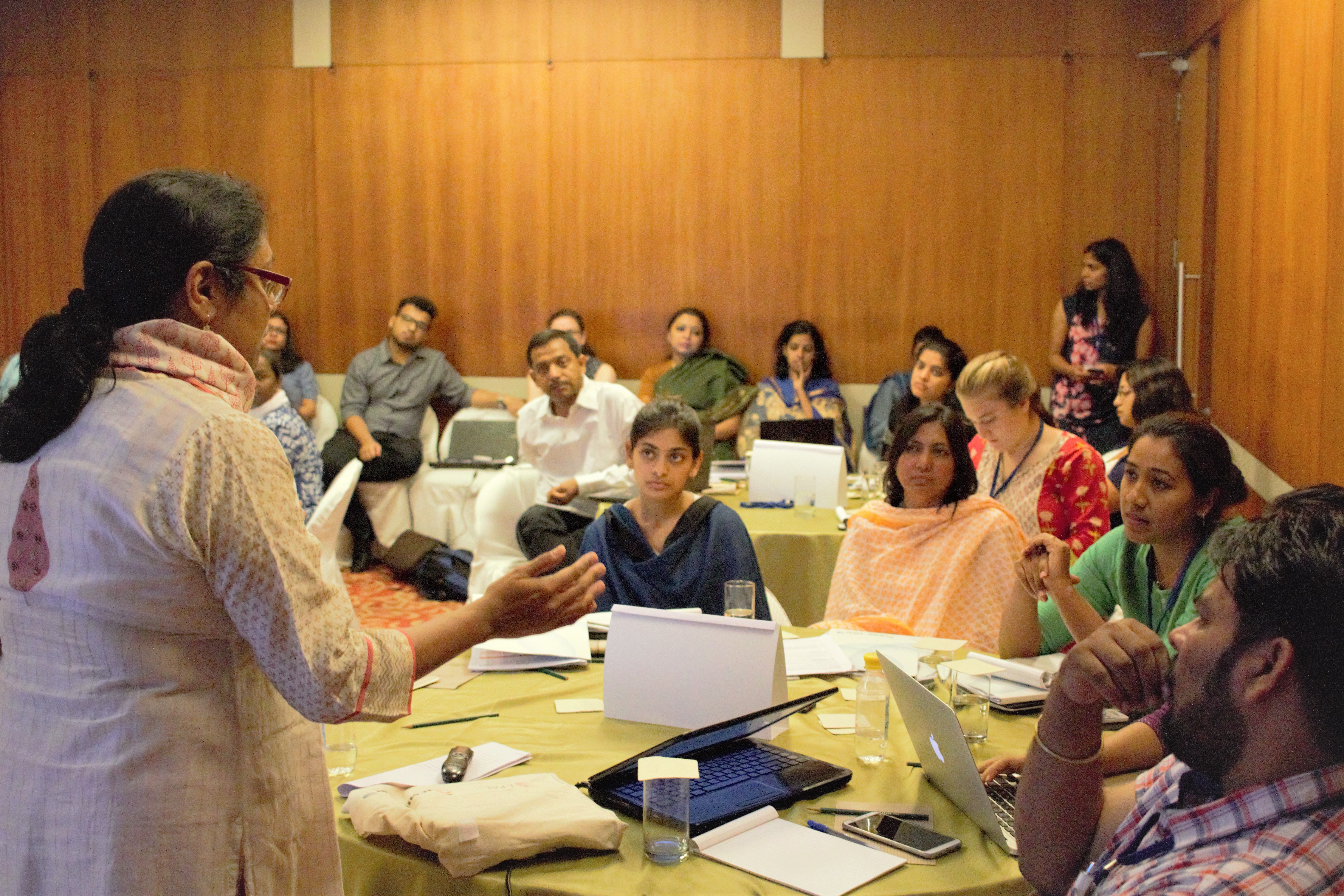Evaluating Social Programmes 2021
Date:
22 November 2021
Time:
8:30 AM - 1:00 PM IST
Venue:
Live via Zoom

We are no longer accepting applications to Evaluating Social Programmes 2021.
–
Evaluating Social Programmes (ESP) 2021 is a five-day course that explores why and how randomised evaluations can be used to rigorously measure impact for better development outcomes. Applications are due by November 7, 2021 at 11.59pm IST.
For students: Please note that CLEAR/J-PAL South Asia is offering scholarships to one (1) student currently enrolled in full-time undergraduate, graduate, or doctoral studies to attend ESP 2021.
About the Course
CLEAR/J-PAL South Asia is offering an online training course on Evaluating Social Programmes. Modelled after our in-person course, Executive Education: Evaluating Social Programmes, this five-day virtual training programme is designed to provide development practitioners, policymakers, researchers, and students with a thorough understanding of randomised evaluations and how they can be used to rigorously measure impact and inform policy.
This online course offers participants a clear introduction to the merits of conducting randomised evaluations of social programmes, when researchers and policymakers might choose to conduct them, and how these evaluations are designed in real-world settings.
The course will cover
- The basics of measuring impact through randomised evaluations
- Technical design choices and other pragmatic considerations when conducting a randomised study.
- Tools that are critical for all programme evaluations—needs assessment, a Theory of Change, and how to measure outcomes effectively.
ESP 2021 will be led by J-PAL affiliated professors and senior CLEAR/J-PAL South Asia staff. Lectures will be supplemented by group discussions of context-specific case studies led by CLEAR/J-PAL South Asia staff, providing participants opportunities to forge connections with peers. Participants will also have the opportunity to discuss their own work and their learnings from ESP 2021 with senior CLEAR/J-PAL South Asia staff through Office Hours.
View the sample agenda to determine the applicability of this course to your learning needs. This sample agenda is provided for reference only.
Who can apply?
This course is designed for programme managers and researchers at international/local development organisations, foundations/donor organisations, government and non-governmental organisations, as well as students, researchers, and development practitioners.
Please note that the level of this course is Intermediate.
Only individuals working or studying in South Asia (Afghanistan, Bangladesh, Bhutan, India, Maldives, Nepal, and Sri Lanka) are eligible to apply to this online training course. Interested individuals in Pakistan are encouraged to apply to the upcoming Evidence-Based Program Design workshop organised by Centre for Economic Research in Pakistan (CERP).
The deadline for applications is 7th November, 2021. Applications will be reviewed on a rolling basis.
Course Focus
Day 1: Introduction to Monitoring & Evaluation (M&E) and Theory of Change
November 22, 13:35 – 17:55 (IST)
On Day 1, participants will be introduced to monitoring and evaluation (M&E) in development research, including the types of questions we can answer through impact evaluations and how we can ensure that these evaluations are based on robust Theories of Change. Participant groups will then chalk out the Theory of Change of a particular programme in group discussions led by J-PAL South Asia staff.
Format: Lecture (Introduction to Monitoring and Evaluation), Case Study Group Discussion (Theory of Change)
Day 2: Measurement
November 23, 14:00 – 18:30 (IST)
On Day 2, we will explore how to define and measure the outcomes of interest in a social programme. The lecture will also cover how to identify potential sources of measurement error in the survey response process, and strategies for mitigating such errors.
Format: Lecture (Measurement), Office Hours
Day 3: Why Randomise?
November 24, 14:00 – 17:55 (IST)
Through a lecture and accompanying case study, we will explore the features of different impact evaluation methodologies and discuss the relative advantages of randomised evaluations over others.
Format: Lecture (Why Randomise?), Case Study Group Discussion
Day 4: How to Randomise
November 25, 14:00 – 18:30 (IST)
Day 4 will provide participants an overview of the basic process of randomisation and explore how to design randomised evaluations for different programme specifications. Participants will then design a randomised evaluation for an example presented to them.
Format: Lecture (How to Randomise), Case Study Group Discussion, Office Hours
Day 5: Research to Policy
November 26, 14:00 – 18:30 (IST)
Using an example of a completed randomised evaluation, Day 5 will focus on how to use research to drive action towards more effective policies and programs for alleviating poverty.
Format: Lecture, Office Hours
Scholarships
CLEAR/J-PAL South Asia is offering one scholarship spot for student applicants to attend ESP 2021. The scholarship consists of a full fee waiver and is open to individuals who are currently enrolled in full-time undergraduate, graduate, or doctoral studies.
Student applicants are requested to indicate their academic affiliation in the application form form. Other student candidates who might be accepted to the course (without the scholarship) are welcome to attend the course with a fee of INR 15,000.
The deadline for applications is 7th November, 2021, 11:59 PM IST.
Fee Structure
The fee structure for ESP 2021 is as follows:
Organisation Type (refer to World Bank Income Groups) |
Course Fee (Service tax extra, as applicable) |
|---|---|
|
- HIgh-income Country For-Profit/Foundation/Academic/Research Institutions/Government - Multilateral, Bilateral and International Organisations
|
35,000 INR |
|
- High-income Country NGO - Low/Lower-middle/Upper-middle Income CountryFor-Profit/Private Sector/Foundation
|
25,000 INR |
|
- Low/Lower-middle Income/Upper-middle Income Country Academic/Research Institution/Government - Low/Lower-middle Income/Upper-middle Income Country NGO -Student: Undergraduate/Postgraduate/PhD ( if not selected for student scholarship) |
15,000 INR |
Please note that two accepted participants from the same organisation are eligible for a 10 percent discount on their total fee.
For more information or assistance, please contact Bhakti Bhowmik (bhakti.bhowmik@ifmr.ac.in).
